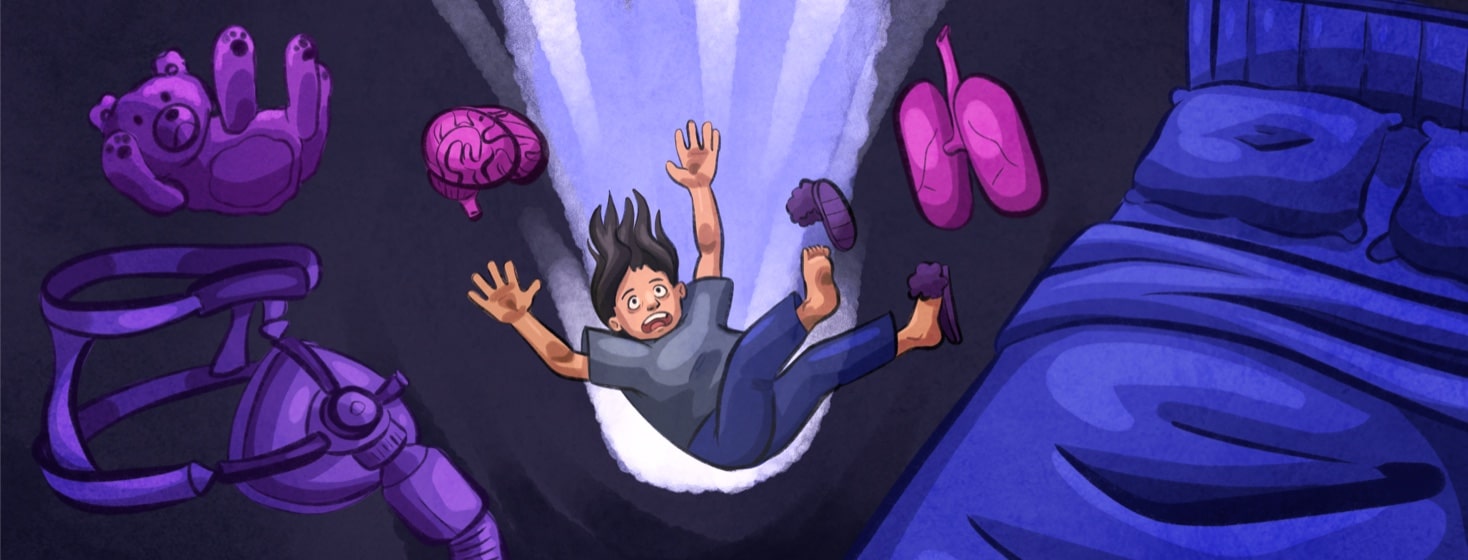Falling Into Another Diagnosis
I have been living with obstructive sleep apnea for about 12 years. Whilst I had heard of sleep apnea before I was diagnosed and was aware of some of the symptoms, I never expected that I had it or would ever have it. I think this is due to the crossover in the main symptoms associated with it and narcolepsy.
Experiencing many overlapping symptoms
According to the Mayo Clinic, the symptoms of obstructive sleep apnea are:1
- Loud snoring
- Episodes in which you stop breathing during sleep (reported by another person)
- Gasping for air during sleep
- Awakening with a dry mouth
- Morning headache
- Difficulty staying asleep (insomnia)
- Excessive daytime sleepiness (hypersomnia)
- Difficulty paying attention while awake
- Irritability
Looking back, some of these symptoms I had for quite a while. I snored really loudly, and my family would comment on how loud I snored when I was over for the holidays. I also snored as a kid and even went on to have my adenoids removed — but surgery was not completed, so snoring was not a new thing. As long as I could remember, I had always snored.
I would often wake up with headaches, had hypersomnia and irritability, and had difficulty paying attention. I could easily attribute all of these to my narcolepsy, as they are all symptoms also typically associated with narcolepsy. To this day, when people tell me that I am being short, crabby, or rude to them, I often respond, "Well, you would be, too, if you felt like you had not slept in 3 days."
I didn't take my partner's observations seriously
My diagnosis didn’t come from any personal observation or realisation, but rather a combination of a contrary opinion and a big fall.
The contrary opinion came from a former partner. As a narcoleptic, I sleep a lot, so it was inevitable that some of our time together would be spent sleeping. What I recall from this time was him telling me that I slept strangely and that I was an erratic sleeper who kept jumping about, which made it impossible for him to sleep.
I didn’t take him seriously and just brushed it off and assumed he was just making excuses. I decided that the real reason for the complaints was just that he wanted to be around less and wished he’d just be honest about it.
I only took his observations seriously after one crazy night. This night will forever be etched in my memory.
After falling out of bed, I had a sleep study done
I was sleeping and was jolted out of my sleep. It felt like a doctor had just used a defibrillator on me and shocked me not just out of my sleep but out of my bed. My body flew up off the bed and I fell, landing on my side table and breaking it.
That woke me up. It was a jarring experience that frightened me and sent me straight to my doctor's office, concerned.
My doctor brought me in for a sleep test, the results of which were that I had obstructive sleep apnea. At the time of the diagnosis, my sleep apnea was quite bad; I remember clearly being told that it was quite severe.
Learning to manage my sleep apnea symptoms
I was given a pump to wear at night, which I was initially wary of. Whilst I understood the benefits, I had no desire to wear strange headgear during the night. It felt strange to fall asleep with something tied to my head, with air being forced down my throat.
However, I quickly adapted and was pleasantly surprised by how much better I was feeling. I was not as exhausted when I woke up, I was having fewer headaches, and most importantly, the machine was ensuring my body was getting the oxygen it needed all night long.
Having a partner can help identify sleep problems
Had I not been dating at the time, I don’t know that I would have connected the falling episode with the wider issues he had raised. I probably would have just assumed it was a result of a vivid dream or hallucinations, both things I already experience with my narcolepsy and not related to something new.
It also helped me realize how beneficial to your health having a partner can be. As someone who lives alone and has lived alone for many years, there is not someone present to notice the differences in how you sleep. To hear when you’ve stopped breathing temporarily or notice that you are moving a lot. Since these are not things that you may remember when you wake, you would not even know it was necessary to flag the problem and then seek help for it.
These days, my symptoms are more controlled
I noticed a big difference when using the pump in the beginning. These days, the benefits appear less noticeable, but if I go too long without using it I will get headaches — which are a kindly reminder that it is, in fact, helping more than I realize.
I do not know if I can honestly say that the fall that night was because of the sleep apnea and not the REM or NREM parasomnias I was also later diagnosed with. That is a story for another day.
What I am sure of is that these days my sleep is less erratic, I move less, less vivid dreams, I am no longer jumping in my sleep, my breathing is regulated, and most days I am headache-free. I owe all of this to an honest partner, good doctors, and one jarring fall.

Join the conversation